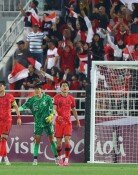International sanctions against Iran have been lifted
International sanctions against Iran have been lifted
Posted January. 18, 2016 07:37,
Updated January. 19, 2016 13:53
With the world largest natural gas and the fourth largest oil reserves, Iran is returning to the global stage with its population of around 80 million and the largest domestic market. It has been 37 years since Islamic Revolution in 1979 when highly-strict economic and financial sanctions were imposed on the nation.
Escaping from the political and economic isolation, and enhancing the cooperation with countries such as the U.S., the leader of the Shia Islam is expected to contribute to rooting out Islamic State (IS). On the other hand, it is likely that a fierce confrontation over seizing dominance in the Middle East would be caused between Iran and Gulf countries such as Saudi Arabia.
It seems that the Korean economy can expect a new breakthrough as well. As sanctions on Iran are lifted, construction, oil refining and aviation industries that have suffered low oil prices and Chinas slower economic growth can have more exporting opportunities.
The U.S. and the EU announced on Saturday (local time) that the economic sanctions against Iran, which had been imposed due to its suspicious nuclear development program, have partially lifted. On July 14, 2015, the six nations (the permanent members of the United Nations Security Council and Germany) and Iran agreed that Tehran would shrink its atomic program while sanctions on the nation are lifted in return.
The International Atomic Energy Agency (IAEA) confirmed on Saturday local time its verification that Iran had faithfully complied its obligation in Joint Comprehensive Plan of Action (JCPOA) and satisfied the requirement to be lifted with Western economic sanctions. U.S. President Barack Obama signed the executive order lifting some of the U.S. economic sanctions on Iran. European Union Foreign Affairs Chief Federica Mogherini said that the Implementation Day has come.
With the lifting of sanctions, Iran is able to recoup some 100 billion U.S. dollars in assets frozen overseas, which includes its sales of oil. In addition, it could resume its export of crude oil and petrochemical products to the U.S. and the EU with free transactions in the areas of shipping and port, automobiles, aluminum and steel. Financial institutions such as the Central Bank of Iran are now able to make financial transactions with overseas financial agencies.
This is a significant milestone that reflects the good faith effort by all parties to fulfill their agreed commitments, said UN Secretary-General Ban Ki-moon. South Korean Foreign Affairs Minister Yun Byung-se urged Tehrans cooperation for the effort at his congratulatory note to Iranian Foreign Minister Mohammad Javad Zarif that says Irans nuclear agreement and lifting of sanctions could be reference point for resolving nuclear issues with Pyongyang.
raphy@donga.com







